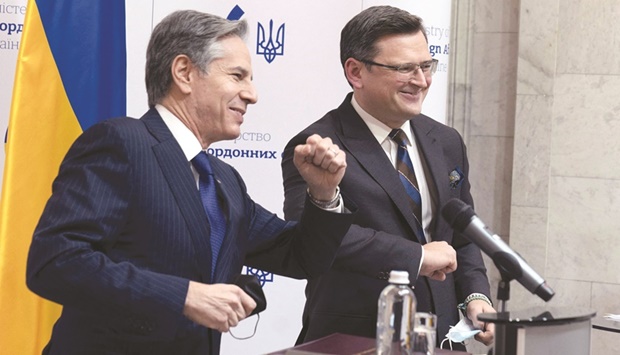US Secretary of State Antony Blinken yesterday urged Russian President Vladimir Putin to choose the “peaceful path” on Ukraine, as he visited Kyiv to show support before crunch talks with Russia later this week.
Blinken, who is due to meet Russian Foreign Minister Sergei Lavrov in Geneva tomorrow, said he would not present a formal response to Russian proposals at the talks, despite Moscow’s demands.
He said the onus was on Putin to dispel fears that Moscow is planning an invasion of its pro-Western neighbour.
“I strongly, strongly hope that we can keep this on a diplomatic and peaceful path, but ultimately, that’s going to be President Putin’s decision,” Blinken said on a day-long visit to Ukraine.
With tens of thousands of Russian troops massed on the Ukrainian border, tensions between Moscow and the West have reached a post-Cold War high and there are growing fears of a major conflict in Eastern Europe.
Moscow insists it has no plans to invade, but is demanding wide-ranging security guarantees — including a ban on Ukraine ever joining Nato — in exchange for de-escalation.
Days of talks between Western and Russian officials in Geneva, Brussels and Vienna last week made no headway in resolving the crisis.
Blinken’s arrival yesterday in Europe upped the diplomatic stakes, and after Kyiv he was headed to Berlin for four-way talks on Thursday with Britain, France and Germany to seek Western unity, and to Geneva the next day for the meeting with Lavrov.
As well as a permanent ban on Ukraine joining Nato, Moscow is demanding measures that would limit military activities in former Warsaw Pact and ex-Soviet countries that joined the alliance after the Cold War.
Russia is insisting on a written response to its proposals, but Blinken said that would not happen tomorrow.
“I won’t be presenting paper at that time to Foreign Minister Lavrov,” he told reporters after meeting Ukrainian President Volodymyr Zelensky and Foreign Minister Dmytro Kuleba.
“We need to see where we are and see if there remain opportunities to pursue the diplomacy and pursue the dialogue which, as I have said, is by far the preferable course,” he said.
Kuleba said Kyiv hoped the talks in Geneva would make Russia “less aggressive and more constructive”.
He also insisted that Ukraine is “not planning any offensive operations” against pro-Russian separatists that could spark a response from Moscow.
Kyiv has been battling Moscow-backed forces in two breakaway eastern regions since 2014, when Russia annexed the Crimean peninsula from Ukraine, with more than 13,000 people killed so far.
On the streets of the separatist-held city of Donetsk in eastern Ukraine, residents said they hoped a broader conflict could be avoided.
“Talks are good, at least it’s not war,” Alexei Bokarev, a 77-year-old retired miner, told AFP in the city, where signs on Soviet-era buildings read “Glory to the Warriors of Liberation”.
“The guns are quiet and negotiations are going on, it means that there is some kind of a search for a solution. How will this end? Nobody can say,” he said.
Blinken told reporters in Kyiv that Moscow had the capacity to move more forces close to Ukraine “on very short notice” and was looking “to challenge some very basic principles that undergird the entire international system”.
Washington has rejected Moscow’s demands as “non-starters” and warned that any invasion of Ukraine would be met with severe economic counter-measures. A senior US official confirmed during Blinken’s visit that the United States had authorised an additional $200mn in security aid to Ukraine, on top of $450mn already delivered by President Joe Biden’s administration.
Tensions increased on Tuesday with the launch of joint military drills between the forces of Russia and ex-Soviet Belarus, which also neighbours Ukraine.
A US official said the exercises could presage a permanent Russian military presence involving both conventional and nuclear forces in Belarus.
Kremlin spokesman Dmitry Peskov said yesterday that the Kremlin was still waiting for written answers to its proposals, but described tomorrow’s talks in Geneva as “extremely important”.

Ukrainian Foreign Minister Dmytro Kuleba (right) and US Secretary of State Antony Blinken bump arms prior to a presser after their meeting at the Ministry of Foreign Affairs in Kyiv yesterday. (AFP)
